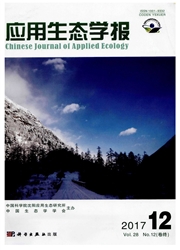

 中文摘要:
中文摘要:
以黄土高原南部17年长期定位试验不同处理土壤为研究对象,研究了不同肥料处理及撂荒条件下土壤氮素矿化特性、灭菌与不灭菌条件下不同肥力土壤对施入外源硝态氮转化的影响.结果表明:氮磷钾化肥和有机肥配施(MNPK)及长期撂荒处理显著提高了土壤有机质和全氮含量以及土壤氮素矿化量和矿化率;氮磷钾化肥(NPK)处理虽然提高了土壤无机氮含量,但对土壤有机质、全氮、土壤氮素矿化量和矿化率的影响相对较小.高温高压灭菌显著增加了土壤铵态氮含量,但对不同处理土壤硝态氮含量无明显影响;在灭菌土壤培养过程中,土壤铵态氮含量呈显著增加趋势.同一土壤类型,不论灭菌与否,培养过程中施入土壤的硝态氮含量保持相对稳定,说明在本研究培养条件下,生物因素和非生物因素对外源硝态氮在土壤中的转化无明显影响.
 英文摘要:
英文摘要:
Soil samples were collected from a 17-year fertilization experiment site in southern Loess Plateau to study the effects of different fertilizations and fallowing on the characteristics of soil nitrogen mineralization, and the transformation of exogenous NO3^--N in sterilized and non-sterilized soil samples. The results showed that a combined application of manure and chemical NPK and longterm fallowing increased the contents of soil organic matter, total N, and mineralized N, as well as the N mineralization rate significantly, compared with the control. Applying chemical NPK increased soil inorganic N content, but had less effects on the contents of soil organic matter, total N and mineralized N, as well as the N mineralization rate. Autoclaved sterilization resulted in a significant increase of soil NH4 ^+-N content, while soil NO3 --N content remained relatively constant whether sterilization or not, suggesting that under the conditions of our incubation, abiotic and biological factors had no significant effects on the transformation of exogenous NO3^--N.
 同期刊论文项目
同期刊论文项目
 同项目期刊论文
同项目期刊论文
 期刊信息
期刊信息
